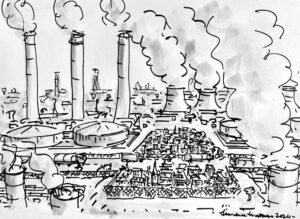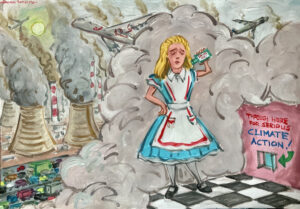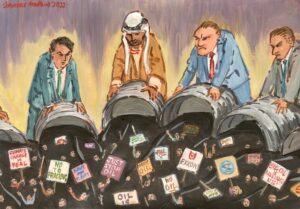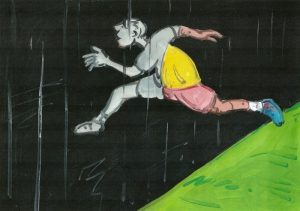It’s about the climate…
- Posted by Lawrence Mathias
- On
There’s an awful lot of pain and grief reported in the world today, and it is bad. Gaza, and now Lebanon, are bloodbaths with a vast and vicious terrorist onslaught by Israel responding to the October ’23 terrorist murder attacks. Ukraine limps on, valiantly battling it out against the Russian military meat-grinding machine. Nationalism and the far right are on a roll, there are clamp downs on civil protest, and hostile cyber infiltration by unfriendly governments is a constant threat. And behind it all, a cost of living crisis pushing those most marginalised closer to a cliff edge…
The Face of War
It’s all a bit hopeless, so it would seem. But is it? Could it be that the hopelessness is more to do with the mediocrity of options with which we are routinely presented? A new Labour government at the helm and we’re promised…austerity, but with a little bit of slackening off as the books are properly serviced. New green initiatives, but piloted through by the private finance of assorted questionable investors. A lot of hazy talk about opportunity, hope and the future, but no captivating key issues around which to rally all this half-hearted cheerleading.
To many of us, it feels bewildering that we still aren’t talking enough about what, after nuclear obliteration, is the central crisis behind it all. The first COP, or Conference of the Parties discussing the facts of climate change, was held in Berlin, 1995. Now, almost 30 years later we are in the position of being just as dependent on fossil fuels for most of our global energy supplies as back then – roughly 80% – but with a significantly higher proportion of CO2 in the atmosphere, and a more precarious state of affairs in the natural world. We have seemed incapable, or our leaders have, of taking the significant steps needed to slow the inexorable rise of greenhouse gases. The fossil fuel industry and its lobbyists have captured most of the corridors of power, from America to Australia with the rest of the world between. We are on track to smash the 1.5C level rise above pre-industrial average temperatures quite likely before the end of this decade, let alone the 2050 timeline originally set for such an increase. A steadily heating world would undermine all societies and precipitate an ecological collapse on a scale no human has ever witnessed. It’s a thought that doesn’t bear countenance.
So what is it that we, the apparent bystanders, can do about it all? It’s a question which can only really be answered in the plural, ‘we’ – and there is probably a lot more to be offered than we realise. But we urgently need an open and full discussion about it first, one that is well-informed and democratic, responding to all points of view. And to do this, a proper societal context is needed, ideally through a well-motivated government forum for debate, or the enablement of such discussion on a local and national level. Landscaping with Priorities in Mind
Landscaping with Priorities in Mind
In April 2025, Haverhub in the Pembrokeshire county town of Haverfordwest will host a show intended as a contribution to the forum idea. I’m currently in the process of gathering partners and participants who would all like to contribute to this most vital of unheard debates. What do we need to do? What are the paths we must follow for a sustainable future? What are the real costs – of not following these paths and of following them? These are some of the questions the show will ask through a wide range of work, a fusion of art and economics, art and politics, art and environmental science and art and farming.
It’s a vast subject and one that touches every aspect of our lives. Paintings, installations, video, multi media and performance will all feature in the mix, with several live lead-in events planned for the earlier part of the year. ‘It’s All About the Climate…’ will aim to draw together many separate threads and unite them in a coherent exhibition of the creative and the practical, visualising solutions to some of the enormous challenges ahead. The show will be a first step along the road of discussion, but its sights are on the future. And that future in its more uncomfortable form looks like it could be with us sooner than we might have thought. Let’s hope this debate might happen even faster.



